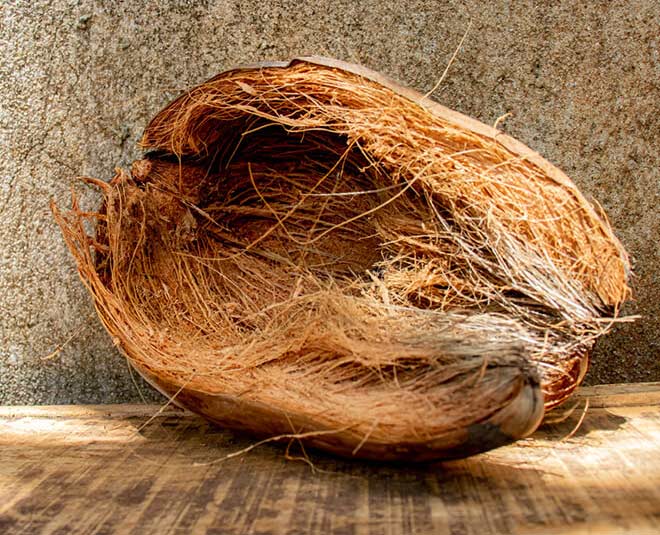
Image: www.pinterest.com
In the realm of agricultural wonders, the coconut palm stands tall, its towering stature bearing a myriad of blessings. Among its many remarkable features, the fibrous husk that encases its precious fruit has emerged as a catalyst for sustainable solutions, offering a wealth of applications across industries. Composed of a conspicuous brown layer and a thick, stringy inner lining, this versatile material is poised to revolutionize sectors ranging from construction to horticulture and beyond.
Unveiling the Enigma of the Coconut Husk
The thick, protective husk that envelops the coconut fruit plays a crucial role in safeguarding its delicate interior during its journey to maturity. After harvesting, the husk undergoes a separation process that yields the fruit and the fibrous treasure that surrounds it. This fibrous material, also known as coir, possesses exceptional resilience and water-resistant characteristics, making it a sustainable substitute for a myriad of materials in various industries.
Embracing Innovation: Applications in Construction
The construction industry has embraced the versatility of coconut husks, recognizing their potential as a sustainable and cost-effective alternative to traditional building materials. Processed coconut husk is transformed into sturdy insulation panels, showcasing exceptional insulation properties that regulate indoor temperatures, reducing energy consumption for heating and cooling systems. Its moisture-wicking capabilities effectively prevent condensation and rot, ensuring structural integrity while promoting a comfortable indoor climate.
Horticulture Haven: The Power in Potting Mix
Horticulture enthusiasts have long recognized the benefits of incorporating coconut husk into potting mixes, employing it as a natural soil amendment that nourishes plants throughout their life cycles. Its excellent drainage and moisture retention properties create an optimal environment for root development, allowing plants to thrive without the risk of oversaturation. Coconut husk’s resistance to decomposition ensures long-lasting aeration and prevents soil compaction, promoting optimal nutrient absorption.
Harnessing Functionality: Applications in Packaging Solutions
Moving beyond its traditional uses, coconut husk has found innovative applications in the packaging industry. Processed into biodegradable and sustainable alternatives to synthetic materials, coconut husk transforms into protective packaging inserts and cushioning materials. These environmentally friendly solutions not only safeguard fragile items during transportation but also biodegrade naturally, mitigating the environmental impact associated with improper waste disposal.
Functional Fibres: Exploring Industrial Applications
The fibrous nature of coconut husk has opened doors to its utilization in various industrial sectors. Processed husk fibres serve as a sustainable substitute for synthetic materials in the production of items such as ropes, cords, and even mats. Their durability and resistance to wear and tear make them ideal for applications requiring robust and long-lasting materials.
Energy Efficiency: Generating Renewable Energy
The resourceful nature of the coconut husk extends even to the realm of renewable energy. Through a process called gasification, coconut husks can be transformed into a clean-burning fuel source that generates electricity. This sustainable energy production method utilizes a closed system, preventing harmful emissions from polluting the environment.
Conclusion
The coconut husk, once considered a byproduct, has evolved into an invaluable resource, wielding the power to transform industries towards sustainable practices. As we continue to explore its multifunctional potential, we uncover a myriad of ways to harness its natural abilities, paving the way for a greener and more sustainable future.

Image: www.herzindagi.com
Husk Of Coconut Is Made Up Of